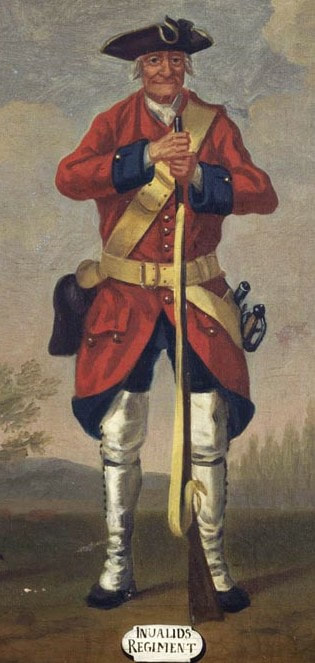|
On March 13, 1719 we have the founding of Colonel Edmund Fielding’s Regiment of Invalids. They formed from out pensioners from the Royal Hospital at Chelsea. This was the humble beginnings for the 41st Regiment of Foot (which would go on to become the Welch Regiment, then the Royal Welsh Regiment and ultimately the Royal Welsh). In his A History of the Services of the 41st (the Welch) Regiment (1899) by Lieutenant and Adjutant D.A.N. Lomax (1st Battalion the Welch Regiment) we are offered this:
Their existence seems to have been a very quiet one, but probably well suited to the deserving class of soldiers of which the regiment was composed. A great many of the men were married, and the officers were generally so aged as to be unfit for the most trivial exertion. The military character of the regiment of Invalids was therefore uninteresting, and their history, in consequence, is somewhat dull and monotonous. (page 2) From this introduction, who could believe that we would shift our attention to mutinies of Highland Regiments and the 77th (Duke of Atholl’s Highlanders) pitted against the 41st Invalids in the “Battle of Portsmouth”? Lomax gives brief mention to this incident but our James Yamorsky gives a much deeper examination in this article in our history section. Please follow the link for this fascinating read! In closing, I offer the complete poem “The Battle of Portsmouth”: When the long Yankee war had ceased, A gallant Highland corps Was ordered hither to embark For Indias distant shore. But of the valiant Scots, each man Sighed for his native home, To join again his native clan, And o'er the mountains roam. In fair Stokes Bay the transport lay, And boats were on the strand, No soldier would the word obey Which ordered "Leave the land! "We've served our King and country well Full many a fiery day. And is it lawful now to sell And send us far away?" The old Fogeys then opposed the squall Which every townsman feared, Till whistling shot struck Tommy Prawl, When quick they disappeared. Foolish it would have been to stay - Their courage who can doubt? But shot and powder none had they - What could be done without? Their leader bold was captive caught, For quarter forced to beg, In vain upon escape he'd thought For he'd a wooden leg. I've heard the aged folk declare, Nor doubt I what they say, Those with long legs the happiest were On that eventful day. I've heard of one who fled so fast (Sure running was no crime) Into a builder's cellar cast, Up to his neck in lime. Suffice it, that through all the place Confusion held her reign. Till the braw Scots marched off apace, When peace appeared again. (By an unknown inhabitant of Portsmouth)
0 Comments
Your comment will be posted after it is approved.
Leave a Reply. |
AuthorsThese articles are written and compiled by members of the 41st Regiment Living History Group. Archives
January 2023
Categories |
